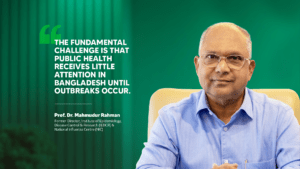1. Let’s start with your childhood and academic journey. What inspired you to take on leadership roles across multiple industries?
I was born in Mauritius, a very small island in the Indian ocean located SouthEast of Africa with a population of only 1.2 million people. Coming from a Gujarati family from Surat with Arab heritage, I was raised with a rich cultural background and a strong sense of community and generation in business.
In Mauritius, we had a well-rounded upbringing, engaging in various sports and activities while growing up bilingual, speaking of English and French as for a Mauritian most of us can speak 7-8 languages.
In Grade 8, my family moved to Canada due to the limited educational opportunities in Mauritius. With a large family already settled there, we adapted quickly. I pursued a program in Occupational Health and Safety and microbiology.
After getting married I moved to Bangladesh. I continued my education in Applied Science in Environmental Science majoring in hydro-planning in North South University followed by masters in Mph (master in public health) focusing in Epidemiology and research in infection control focusing in children.
Studying in Bangladesh has been amazingly fun and it is well connected with the field of interest I am into as doing research with a population of 170 millions, the result comes closest to accurate.
Being a Gujrati origin business is by default with us. During the Anglo British time all the Gujrati family were trying different trading. Our great grandparents explore different areas of every business and explore different fields and this is how we expanded in Aluminium , Agro Base, Carpet Mills ,Diamonds and steel. Surat at time was the main port that have been a plus point for an open passage for the Gujrati traders. Business expanded to Bangladesh, Myanmar, Sri-lanka, Pakistan, Afghanistan, Iran and again in the continent of Africa. My great grandparent to parents into business has always inspired me to explore all fields that are in front of me whether big or small.
As business grew, I felt that the traditional way of doing business needed changes also. Recognizing the lack of proper worker protections and safety measures, I saw occupational health and safety as a crucial area for improvement.
I witnessed firsthand the significant challenges faced by workers and employees. This reinforced my belief in the importance of occupational health and safety in creating better working conditions.
Today being with Standard Group I can, coupled with commitment to research and science, demonstrates a unique ability to identify challenges and find solutions that can make a significant impact on its employees and through my history of family business of success and failures, the ability to see the gaps and how to be filled.
My journey from Mauritius to Canada, then Bangladesh, has given me a deep commitment to both personal and professional growth. It’s fascinating how we can weave together the cultural heritage, educational pursuits, and passion for applied science, pure science and business multiple languages together has opened a multi-dimensional world for me.



2. As the Chief Executive of Occupational Health and Safety and Chief of Well-being at Standard Group, what are the key focus areas in ensuring employee safety and well-being?
The best companies in the world always prioritize Occupational Health and Safety, with executive leadership playing a crucial role in ensuring employee well-being and workplace safety. A company’s success depends on strong, visionary leadership that is committed to these principles. Standard Group has set an example in Bangladesh for its discipline and visions.
A well-structured safety program is essential, along with a comprehensive safety management system and regular training. These elements create a foundation for a safe and efficient work environment. I always emphasize the importance of employees as the core of an organization, ensuring that both their physical and mental well-being are prioritized through various initiatives.
Company culture is another key factor. Maintaining a continuous culture of safety, enforcing policies, and implementing strong risk management practices are critical. Successful companies lead the way in Occupational Health and Safety, with executive leadership setting the standards for employee well-being and workplace safety.



3. As the CEO of Moments, can you share the inspiration behind the brand? How do you see the potential of kids’ wear in the Bangladesh market and on the international stage?
Being born and raised in Mauritius, a country with a strong French cultural influence, we had the opportunity to wear beautiful French and European dresses. I have always been drawn to simplicity and minimalist design, which greatly influenced my upbringing.
In Bangladesh, I noticed a gap in children’s fashion. Many children lack opportunities to dress up, even though childhood is one of the most memorable times in life.
When I am working in hospitals, with infections, and among refugee children, I see children hygiene and poorly dressed clothes make me sad. I really want children to dress properly, to build confidence and develop self respect and psychologically strong. Dressing up clean with proper hygiene gives us a different level of personal empowerment.
Every underprivileged family has that one person who breaks the chain of poverty. A child cannot be judged on his/her status. I believe together we can help minimize the gap.
Every child should have access to basic, comfortable clothing and be able to enjoy fashion yet understand the difference between sufficient economy and circular economy ideologies.
In the realm of fashion, the clash between Sufficiency Economy and Circular Economy ideologies prompts reflection on our consumption habits and their impact on the environment. While Sufficiency Economy advocates for moderation and self-reliance, Circular Economy champions resource efficiency and waste reduction. Within this paradigm, Moment’s vision is to work toward the development of smart clothing for children from recycled polyester fibers that embodies the principles of Circular Economy, offering a sustainable alternative to traditional fashion production methods.
That’s when I started Moments., the brand took shape, and the name Moments was born from the idea that every child deserves memorable moments in life.
Something I like to work and would love to implement is the The development of smart clothing for children from recycled polyester fibers is a prime example of Circular Economy principles in action. By repurposing post-consumer waste into high-quality clothing, we are able to reduce the demand for virgin materials, minimize waste sent to landfills, and conserve natural resources. This approach not only benefits the environment but also creates economic opportunities and promotes social equity by closing the loop on material flows and extending the lifespan of products.
My vision for the brand became clear. Children need beautiful, comfortable, and versatile clothing so they can move freely with dignity and confidence. Together, we can build a future where fashion is not just about looking good but also about doing good—for the planet, for people, and for generations to come.
I would like to express my heartfelt gratitude to all the influential people of Bangladesh from every sector who have supported Moments brand in the past 4 years and we hope we continue to grow as a family.

4. Given your involvement as a panelist with the International Human Rights Commission and your role in projects like Project 100 across India, Sri Lanka, and African continents, how do you view the intersection of business and social responsibility?
I believe that combining philanthropic work, business, and social responsibility creates a powerful synergy that drives positive change in society while also ensuring business growth. When businesses integrate social responsibility into their operations and engage in philanthropic efforts, they not only address societal challenges but also foster loyalty among customers, employees, and investors.
I strongly believe that every child should be celebrated, not based on social status, but for their unique qualities and talents. Regardless of financial background, they deserve a meaningful childhood filled with joy and self-expression.
Through Moments, I aim to shift the narrative from status to substance, fostering a culture of respect, discipline, and appreciation for every child’s individuality.



5. Reflecting on your work with the Rohingya camps in Cox’s Bazar and your experience in epidemiology dealing with infections at Maa and Shishu Hospital in Dhaka, what challenges have you identified faced by vulnerable communities, and how can businesses contribute to positive change in these areas?
One of the most pressing challenges in Bangladesh is the impact on women and children, who are among the most vulnerable in society. This is closely linked to maternal health, reproductive health, lack of access to contraception and safe abortion, as well as nutrition. Malnutrition significantly affects both mothers and children, and similar conditions are prevalent not only in Bangladesh but also in refugee camps in the world and in many Hospitals, and across developing countries in Africa, Sri Lanka, and India.
Business contributions play a crucial role in driving positive change in this area. Collaboration between the private sector and the government is essential in improving healthcare outcomes for women and children. By combining the strengths of both sectors—government regulatory capacity and private sector innovation and efficiency—sustainable solutions can be achieved more effectively. The private sector can bring capital, expertise, and technology, while the government provides regulatory frameworks and public trust, ensuring that healthcare services reach underserved populations. By pooling resources, both sectors can work together to enhance healthcare services and create lasting impact.



6. Reflecting on your involvement with EO Bangladesh, how has this community shaped your perspective on entrepreneurship, and what advantages do you believe it offers to entrepreneurs?
EO has been an excellent platform for me and an amazing journey as well. Being part of this network has provided valuable opportunities for collaboration and growth. Engaging with the EO community offers numerous advantages, especially in improving healthcare for vulnerable groups like women and children by leveraging collaboration, innovation, and access to resources.
Through EO, I have gained a broader vision and a deeper understanding of the impact we can create. The presence of pharmaceutical industries and factories within the network has played a crucial role in promoting healthcare and education, further strengthening our collective efforts toward meaningful change.



7. Looking ahead, what are your aspirations for the future of EO Bangladesh, and how do you envision the association contributing to the growth and development of the entrepreneurial ecosystem in Bangladesh?
The entrepreneurial ecosystem in Bangladesh has immense potential, with a diverse range of talents and specialties. With the right support, resources, and a strong collaborative network, the country is well-positioned for a vibrant future driven by its tech-savvy population, increasing focus on innovation, and growing access to capital.
EO Bangladesh has a critical role to play in shaping this future by providing mentorship, advocating for policy changes, offering essential resources, and fostering a collaborative environment. By supporting entrepreneurs across various sectors—from tech innovation to social impact ventures—the association can contribute significantly to the growth and development of Bangladesh’s entrepreneurial landscape.
Being a man/woman means being a leader of change. In every era, you write a new tale of dedication. Your impact is felt in every achievement, every excellence. You shape leadership and breathe life into dreams—Your ambition knows no bounds. You stand proud: authentic, educated, empowered—A nurturer, a changemaker, A mother of future generations. Every challenge you face is a chance for triumph—Met with unwavering ambition and unyielding resolve. Your race against time is run with love and compassion. Inspired by your past, you shape the future. You embody the soul of a nation, carrying its ambition, inspiration, and hope. With you, the world becomes a better place. This is a heartfelt tribute to every Bangladeshi man and woman who, in his/her own unique way, has contributed to our nation’s journey of growth.






